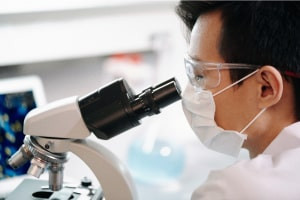The role of a microbiology laboratory technician covers diverse tasks, from identifying microorganisms in different samples to preparing and maintaining experimental equipment. This course covers important microbiological principles and breaks down the steps to take to become a technician in this field. We begin by identifying the different types of organisms that may be studied in microbiology, including viruses, bacteria and protozoa. We then describe the important differences between the two main cell types found in microorganisms: prokaryotic and eukaryotic. The course then delves into metabolic processes and essential enzymes before introducing you to microbes. We establish what they need to survive and grow and trace the phases of bacterial growth. The course then demonstrates how to grow and measure microbes in culture media for observation and identifies what chemical agents to use to control them.
This course then examines the different types of prokaryotes, which are divided into different types of archaea and bacteria. Much of microbiology involves careful categorization and we lay out the kingdom of tiny creatures, including various types of phyla. We take you through the different types of eukaryota: fungi, algae, protozoa and slime and water molds. We then cover viruses, viroids and prions and unpack the difference between deoxyribonucleic acid (DNA) and ribonucleic acid (RNA). This explains virus entry in animals and how diseases can enter and kill plants. The course demonstrates how microbes infect their hosts and what medical professionals can do to prevent workplace infection while we investigate how infectious microbial diseases spread. Do you know how your immune system works to fight off infection and what cells prevent your falling ill? This course answers such important questions as the complex and amazing immune system is a system worth studying in detail. This course establishes the purpose of the immune system and investigates how antibodies build up the body’s immunity.
We then analyze the nature and purpose of vaccines, including their history and mechanics. Microorganisms are always present in our environment and this course outlines their positive and negative effects. We study the carbon, nitrogen and sulphur cycles as well as the microbiology of different natural environments. We conclude with an examination of the use of microbiological techniques in the food industry and related sectors to ground the theory covered in practical settings. This course explains the role of microorganisms and takes you through the vaccine development process to enable you to explore a career in a laboratory. Medicine advances every day, making us healthier and safer, and this free online course can help you take your spot on the front lines of the battle against sickness and disease.
What You Will Learn In This Free Course
View All Learning Outcomes View Less All Alison courses are free to enrol, study, and complete. To successfully complete this Certificate course and become an Alison Graduate, you need to achieve 80% or higher in each course assessment.
Once you have completed this Certificate course, you have the option to acquire an official Certificate, which is a great way to share your achievement with the world.
Your Alison certificate is:
- Ideal for sharing with potential employers.
- Great for your CV, professional social media profiles, and job applications.
- An indication of your commitment to continuously learn, upskill, and achieve high results.
- An incentive for you to continue empowering yourself through lifelong learning.
Alison offers 2 types of Certificate for completed Certificate courses:
- Digital Certificate: a downloadable Certificate in PDF format immediately available to you when you complete your purchase.
- Physical Certificate: a physical version of your officially branded and security-marked Certificate
All Certificate are available to purchase through the Alison Shop. For more information on purchasing Alison Certificate, please visit our FAQs. If you decide not to purchase your Alison Certificate, you can still demonstrate your achievement by sharing your Learner Record or Learner Achievement Verification, both of which are accessible from your Account Settings.
















 Avg. Hours
Avg. Hours  Contains Video
Contains Video  CPD Accredited
CPD Accredited 


 Total XP:
Total XP: 
 Knowledge & Skills You Will Learn
Knowledge & Skills You Will Learn 


